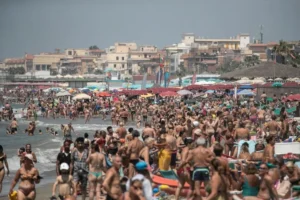“Medieval theologians described a tripartite process of ensoulment over the course of fetal development. The poet Dante Alighieri gives one of the most cogent explanations of this concept, which goes back to Aristotle, via Thomas Aquinas, Albertus Magnus, and others. Dante’s description of when God breathes life into the fetus takes place in the Divine Comedy on the sixth terrace of Purgatory. Dante’s Purgatory is imagined as an island-mountain organized according to the Seven Deadly Sins. On the terrace of gluttony, sinners circle past an offshoot of the Tree of Knowledge, which produces a delicious odor that makes them excruciatingly hungry and emaciated in appearance. Dante asks his two guides, the poets Virgil and Statius, how the disembodied spirits can become so thin if they do not need nourishment. Statius responds with a digression on sexual reproduction and embryology (Purgatorio 25.37-108) in order to account for the continuity between humans’ mortal bodies and their aerial bodies in Purgatory. He explains how the fetus takes shape and passes through three stages, first being endowed with a soul like that of a plant, and then with that of an animal, at which point the bodily organs are fashioned. Only after the articulation of the brain does God breathe into it a specifically human spirit, capable of self-reflection and speech. This new soul then combines with the two already inhabiting in the body, and after the person’s death, when the soul’s connection to the body is severed, it radiates around itself an ombra, a sort of shadow or mirror body that continuously reflects its inner condition.” —Olivia Holmes, “When was an embryo considered a person in the Middle Ages?,” Cambridge University Press, January 31, 2023 (retrieved December 30, 2023)
“The Tour de France Exits Purgatory”

“We are, I think, in a form of purgatory, have been for two weeks. Not knowing is purgatory. For fans, not having an answer as to which of your two favorites will win is an anticipatory wait for salvation. For journalists, writing longs for denouement and finally conclusion and only then can one pinpoint narratively where the climax was. In Purgatorio, the second part of the Divine Comedy, Dante sees the mountain of purgatory as an allegory for his own reconciliation between classical and religious thought – philosophical logic and belief. For us, on our own mountain, we can recognize in his words our own split between analytical frankness about what is going on and hope, blind and courageous as the hope Dante has in God.
“As he ascends up through the layers of souls whose sins are in the process of redemption, and as he approaches paradise, these contradictions, manifested allegorically through Virgil, his guide, the poet of classical antiquity, and Beatrice, his Platonic love who will let him into heaven, become ever more in dialogue with one another. Dante opens up the 11th canto with a version of the Lord’s Prayer as prayed by the proud. He writes what I think can really be seen as a prayer for the Tour de France as prayed by the protagonists:
[. . .]
“And Vingegaard, he is locked in, expressionless, riding as perfectly in form so as to recall Dante’s images of angels carved into gravestones: ‘so truly carved there in his tender posture / you could not see him as a speechless image.’ Fitting for the death of hope increasingly frothing to the surface as one minute approaches, but never quite reaches two. At the end of Purgatorio, Virgil, a pagan, must leave Dante in the garden of Paradise before Dante can ascend to paradise. Indeed, here, one man is no longer following the other.” —Kate Wagner, “The Tour de France exits purgatory,” escape collective, July 18, 2023 (retrieved December 30, 2023)
Contributed by Noah Eckstein, Bowdoin ’21
“Why Do Fascists Love Dante?”
“Italy’s far right has misguidedly claimed the medieval poet as one of its own for more than a century.
“The nightmarish visions of Dante Alighieri, with their many circles of hell, ringed in blood and fire, would seem perhaps a natural draw for politicians who traffic in the rhetoric of us versus them, good versus evil. But this doesn’t fully explain why the poet—who, after all, lived and wrote 700 years ago—finds himself quoted and adored like a medieval poster boy by Italy’s newly resurgent extreme right.
[. . .]
“The newly appointed Culture Minister Gennaro Sangiuliano who, like Meloni, once belonged to a now-defunct neofascist party, said in a recent interview that he viewed Dante as ‘the founder of right-wing thought in our country.’” —Anna Momigliano, “Why Do Fascists Love Dante?,” The Atlantic, February 10, 2023 (retrieved December 28, 2023)
Read more at The Atlantic.
“The Code Purgatorio: Ascension to Clean Code”
“Building upon the previously published Dante’s Code Hell Inferno: the Nine Layers, this part II similarly inspired work takes us further into the Divine Comedy of Software Engineering as a playful and satiric overlay on Dante Alighieri’s Divine Comedy, which you can read in full in Project Gutenberg.
“Now that we have escaped the Code Inferno, before we arrive at the Paradise of Programming we have to make our way through the ten regions of the Code Purgatorio and really master the art of software engineering not only scripting:
- Ante-Purgatorio: Shores of Unorganised Code
- Ante-Purgatorio: Realm of Uncommitted Code
- First Terrace: Pride of Over-Engineering
- Second Terrace: Envy of the Code or Tools of Others
- Third Terrace: Wrath Against Changing Requirements
- Fourth Terrace: Being a Sloth of Continuous Learning
- Fifth Terrace: Knowledge Hoarding and Hero Complex
- Sixth Terrace: Gluttony for Resources
- Seventh Terrace: Lust for New Shiny Tech
- Earthly Paradise in the Code Review Garden”
—Adrian Nenu, “The Code Purgatorio: Ascension to Clean Code”, Medium, October 21, 2023
Read the full post at Medium.
Deadly heatwave named after Dante’s Inferno claims first victim as locals wilt in 45C
“A deadly heatwave named after Dante’s Inferno has claimed its first victim with temperatures soaring closer to an uncomfortable 45C.
The brutal heatwave has caused chaos across Europe and a 44-year-old has since died due to the horror heats which are spreading across the Mediterranean.
[…]
The man died in hospital hours after collapsing, with life-threatening heats now warned of as Brits flock to the Mediterranean to lap up the sun, although the brutal Cerberus weather could prove dangerous.
Cerberus, named after the creature which guards the gates of the underworld in Dante’s first third of The Divine Comedy, is also the name of a sweltering heat weather system in the Sahara.” —Ewan Gleadow, “Deadly heatwave named after Dante’s Inferno claims first victim as locals wilt in 45C,” Daily Star, July 12, 2023 (retrieved November 10, 2023)
- « Previous Page
- 1
- …
- 7
- 8
- 9
- 10
- 11
- …
- 40
- Next Page »




